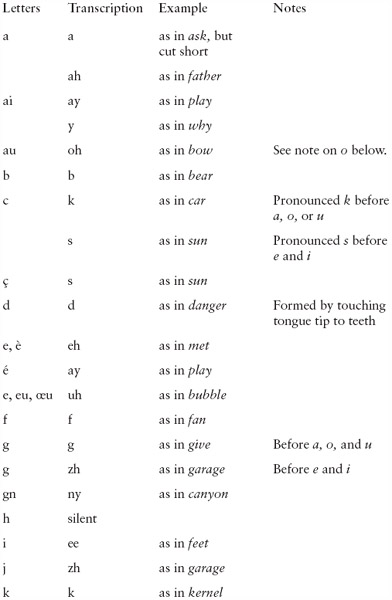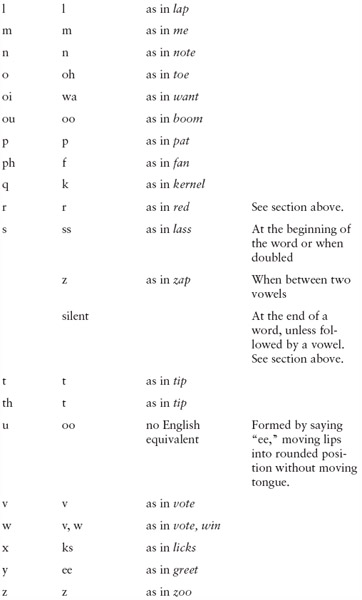EASY
FRENCH
PHRASE
BOOK
NEW EDITION Over 700 Phrases
for Everyday Use Heather McCoy, Ph.D. DOVER PUBLICATIONS, INC. Mineola, New York

Copyright
Copyright 2012 by Dover Publications, Inc.
Text copyright 2010 by Heather McCoy
All rights reserved. Bibliographical Note Easy French Phrase Book NEW EDITION: Over 700 Phrases for Everyday Use, first published by Dover Publications, Inc., in 2012, is a new selection of material from 1001 Easy French Phrases, published in 2010 by Dover Publications, Inc. Library of Congress Cataloging-in-Publication Data McCoy, Heather. New ed. p. cm. cm.
Text in English and French. ISBN-13: 978-0-486-49902-4 ISBN-10: 0-486-49902-2 1. French languageConversation and phrase booksEnglish. I. Title. PC2121.M55 2012 448.3'421dc23 2012019698 Manufactured in the United States by Courier Corporation
49902201
www.doverpublications.com
This book is designed for the traveler or casual user of French who is looking for a handy and manageable guide to basic French phrases.
The phrases included in this convenient volume are some of the basic tools for communication and comprehension that you are likely to need in a variety of French-speaking contexts. The primary focus of Easy French Phrase Book NEW EDITION is daily communication. You will find linguistic structures that focus on describing yourself and others; asking simple questions that one might need when traveling; and interacting in a variety of situations. The phrases have been organized thematically so that you can easily find vocabulary and sentence structures that apply to a specific context. Special attention has been paid to organizing phrases so that you can substitute the vocabulary you need in order to create your own meaning, such as in the following example: Je voudrais prendre (I'd like to have )
une bire (a beer)
un caf (a coffee) You will be able to use this book in a variety of ways, either by preparing for a trip by reading a few sections a day, or by using it on-the-spot by flipping to the section that is most pertinent at that moment.
Easy French Phrase Book NEW EDITION uses a phonetic transcription as an aid to correct pronunciation. (See Scheme of Pronunciation, below.) This transcription is located directly beneath the French entry in the text. (See Scheme of Pronunciation, below.) This transcription is located directly beneath the French entry in the text.
Here are some general principles of pronunciation: Nasalization In French, a vowel is nasalized when it is followed by a single m or n in the same syllable. The transcription of these nasalized vowels appears as: -an, -am, -em, -en - > ahn, ehn
-in, -im - > ihn, ihm
-on, -om - > ohn, ohm
-um, -un - > uhn To produce a nasalized vowel, quickly pass the air through both the nose and the mouth at the same time. The m or n isn't pronounced after the nasal vowel, as follows: franais - > frahn-say; temps - > tahn
pain - > pihn; printemps - > prihn-tehn
bon - > bohn
quelqu'un - > kell-kuhn Silent Final Consonants In French, most consonants at the end of a word are silent, although there are exceptions to this rule: c, f , and l. The consonant r also is pronounced, but is silent when occurring in the endings -er and -ier. The French r The French r can be one of the most challenging sounds for English speakers to pronounce. Pronunciation of the r will depend upon the region of the French-speaking world that you are visiting.
In some areas, the French r can resemble the Italian or Spanish r produced by rolling it on the tip of the tongue. The Parisian r is a more gutteral sound: it's helpful to imagine the sound being produced in the back of the throat, the same place that produces the h in ahoy. The r is voiced, meaning that there is a slight vibration of the vocal cords. The Plural s As mentioned above, consonants at the end of words normally are not pronounced. Make special note of this when pronouncing the s that denotes the plural: Le chat - > luh-shah
Les chats - > lay-shah Notice how the pronunciation of the noun chat does not change between the singular and the plural. This is quite different from English, and is important for English speakers to remember.
Liaison A final consonant that is normally silent is pronounced when it comes before a vowel or h . This phenomenon is called liaison . Note the following change: A final s before a consonant: des livres - > day-leev-ruh A final s before a vowel: des animaux - > daze-ehn-ee-moh The rules for liaison can be somewhat complex, so simply pay attention to the phonetic transcriptions in order to get a feel for when its usage is appropriate. Stress The last syllable of a French word is usually stressed: Beaucoup - > boh- koo However, when the last syllable is an unstressed e ( uh in the transcription used here), the next-to-the-last syllable receives the stress: Formidable - > for-mee- dah -bluh You will also notice that in addition to the stress at the end of a word, there also is stress at the end of a phrase: Je suis amricain et travaille au muse d'art contemporain. - > zhuh swee za -mary- kihn ay tra-vy oh moo- zay dar cohn- tehn -por- ihn .


EASY
FRENCH
PHRASE
BOOK
NEW EDITION
Chapter 1
Greetings and Everyday Expressions
GREETINGS, INTRODUCTIONS,
AND SOCIAL CONVERSATION
One of the ways in which French differs from English is that French uses formal and informal registers of language.
These are expressed in the choice of the subject pronoun ( vous is formal; tu is informal); the form of the verb; and, sometimes, in the way a question is formed. Always address adults whom you don't know well using the formal form of the verb, and reserve the informal for friends and children. It is interesting to note that Americans have a tendency to be informal in many situations in which the French prefer to interact formally. We've indicated below whenever a given sentence is formal or informal. You will discover that although the subject pronoun for we is nous , the pronoun on frequently is used instead. You can usually tell by the context whether the speaker using on is referring to someone in general, or to the first-personal plural form we.
You also will note that another difference between French and English is that nouns in French are either masculine or feminine. This has nothing to do with actual gendersay, the inherent masculine nature of le stylo (the pen), so its better to memorize the gender of a noun rather than try to figure out this system of classification! Another important aspect to remember about the gender of nouns in French is that articles, adjectives, pronouns, and some verbs must agree with nouns in gender and number. We have indicated this below where appropriate by providing both the masculine and feminine forms, with the feminine form indicated either with an e in parentheses or given in a separate example. Note that when choosing sentences to describe yourself, you'll want to choose the appropriate form. 1. Bonjour. Bonjour.
Bohn- zhoor 2. Good evening. Bonsoir. Bohn- swahr 3. Good night. (bedtime) Bonne nuit.













 Copyright
Copyright
